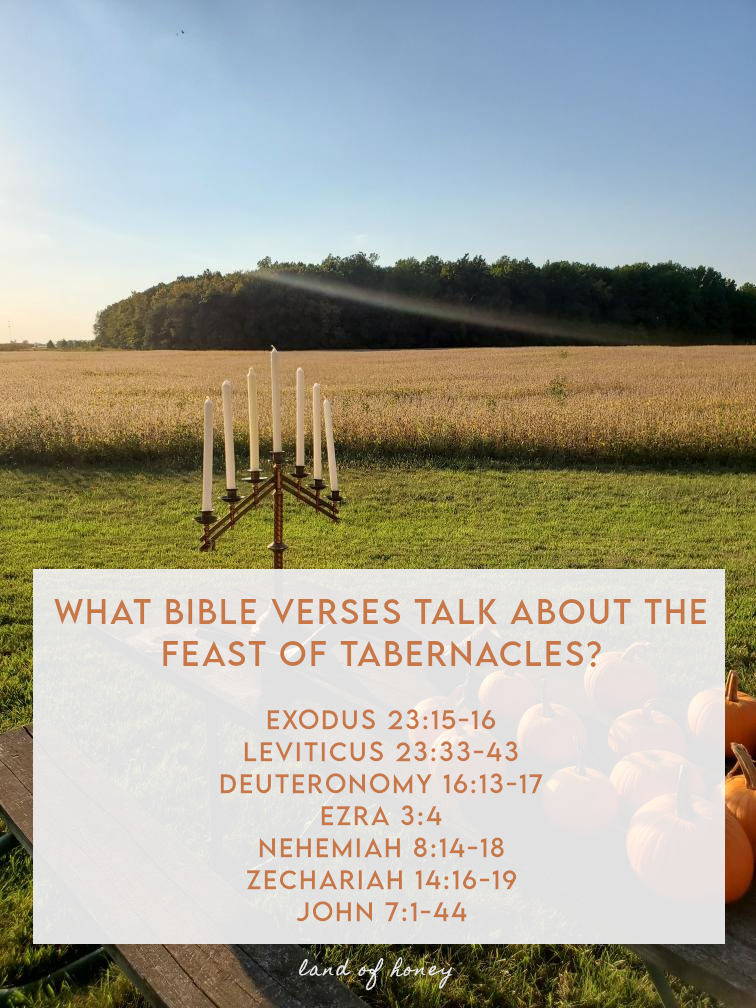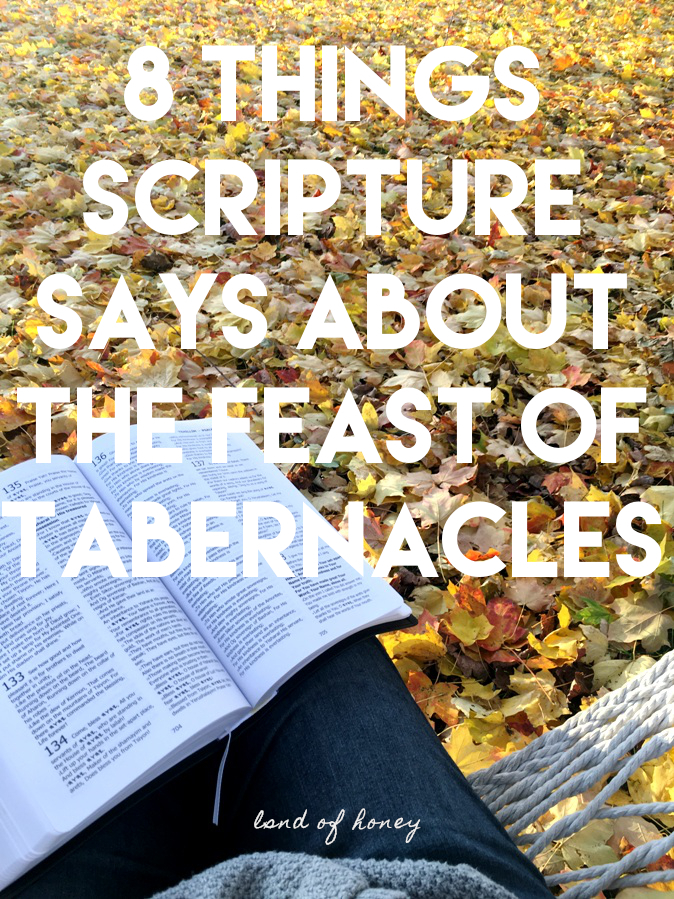Sukkot is the last Biblical holiday of the year. This post has all the information you need to know about this set apart time and how to celebrate this holiday!
Tabernacles, Tents, Booths, or Sukkot?
The Feast of Tabernacles goes by many different names. In Hebrew, it is called Sukkot, which is the plural word for sukkah or temporary dwelling shelters. Because of this it makes sense to translate this holiday as the Feast of Tents, Tabernacles, or Booths. Tabernacles is generally the most common name for it in English.
Who invented the Feast of Tabernacles?
This holiday was created by the Creator, the Living God, YHWH himself. He gave directions for this holiday in Exodus 23:15-16, Leviticus 23:33-43, and Deuteronomy 16:13-17, and it is spoken of elsewhere in Scripture in both the Old and New Testaments.
What is the meaning of the Feast of Tabernacles?
The temporary dwellings or sukkahs of this time call to mind historic and prophetic events of the Bible. The Feast of Tabernacles reminds us of when the people of Israel wandered in the desert on their way to the Promised Land, after the exodus from Egypt. This calls to mind that YHWH made a way for them and provided for their needs while they were in the wilderness. As believers in Messiah, we look forward to the day when He returns to dwell or tabernacle amongst us!
What is the purpose of the Feast of Tabernacles?
The Creator gifted us a special time, and two extra days to rest! He intended to bless us with this holiday. This time is a pause from business as usual. It was intended to be time off work and time to celebrate with family and friends, as well as grow in our faith. We should view this with the same joyous attitude we have when we don't have to go to school or work because of cultural holidays like Labor Day or Memorial Day.
What happens during the Feast of Tabernacles?
During the eight days of Sukkot, believers are instructed to dwell in temporary shelters. There are many different approaches to this. Some people travel during this feast, staying in a cabin or hotel. Others pack up the RV and meet with other believers to camp. Some pitch a tent at home and sleep in their backyard. Others put up a temporary pergola of some sort and eat their meals out there while sleeping inside.
Is the Feast of Tabernacles in the New Testament?
Yes, it is! It was celebrated in the Messiah's day. In fact, the Messiah himself took part in Sukkot celebrations and had a lot to say at that time. Most of John 7 takes place around the Feast of Tabernacles.
Is Sukkot like Shabbat?
Just the first and last days of this Bible holiday are to be treated as Sabbaths where we don't work, shop, run errands, and so on. Not sure what to do on a Sabbath day? This post will help!
Can you work during the Feast of Tabernacles?
While Tabernacles lasts for eight days, we are only instructed to not work on the first and the last day (also called the Last Great Day or the Eight Great Day), as well as the regular weekly Sabbath during that time. You can feel free to work your regular job, buy groceries, do home or camp chores as needed on the other days. Of course, taking time off to focus on the Feast and time with your family can be special and meaningful if that's an option for you, but it's not a Biblical requirement!
Who celebrates the Feast of Tabernacles?
Historically, Sukkot has mostly been celebrated by those of the Jewish faith, but the Bible says nothing about limiting this holiday to only Jews or it being done away with! Like the rest of the Biblical holidays, the Feast of Tabernacles is for all Bible believers, no matter what your family traditions or ancestry might be. Bible holidays are for Bible believers, and by celebrating them we learn to better see the work of the Messiah in Scripture and in our lives.
Is Sukkot a happy holiday?
Very much so! This is an opportunity to joyfully look back on the miracles in the Bible, God's provision in our own lives, and His promises for things to come!
When is the Feast of Tabernacles this year?
It depends on which calendar you go by, but this year (2022) the days land on October 9-17 on the most used calendar. In Judaism, days start at sundown in the evening, so by this reckoning Sukkot would start the evening of Sunday, October 9th.
Where is the Feast of Tabernacles celebrated?
It can be celebrated anywhere you are! At your home, in your church or congregation, or anywhere you travel to. Many people choose to travel to where a group of believers is celebrating.
Are there Sukkot events to go to?
As a matter of fact, there are more gatherings of believers in Messiah every year! People gather all across the US, Canada, and around the world. This post may have a Tabernacles event near you!
How do you celebrate Tabernacles at home?
Today you can celebrate Tabernacles by pitching a tent in your yard or setting up some sort of canopy on your patio. Start with having meals out there or spending time there in prayer and Bible study. Spread the festivity by inviting friends over or going to congregation or a worship night, if that's possible. Give an offering of financial resources or time to a worthy cause or ministry. Take at least the first and last days off from work and ordinary household tasks like cleaning and cooking. Make good food and do fun things like picnicking or visiting an apple orchard. Not everything you do during this week has to be spiritual - this is a time of joy so feel free to do things you and your family find fun!
What do you eat on the Feast of Tabernacles?
While Passover has added food restrictions to not eat anything leavened, Tabernacles comes with no extra rules, beyond the instructions for Biblically clean eating. Since there is some emphasis on the provision of YHWH through the physical harvest from gardens and farms, you could eat what's in season in your area, or foods from your garden if you have one. If you're camping out, it makes sense to eat traditional campfire foods like hotdogs and s'mores (the Biblically clean version of course). We also like to have a chili cookoff during Sukkot, and a make-your-own pizza night is another tradition in our congregation, but feel free to enjoy foods you like!
How do you keep Tabernacles with children?
Teach your children about this special time. Let them know that God made certain holidays for us to enjoy and learn from. Use this time to teach them Bible stories or do crafts or activity sheets related to the Feast of Tabernacles. Most kids enjoy camping and would be excited to sleep in a tent or in sleeping bags in the living room.
What about the Eighth Great Day?
Tabernacles is eight days long and the Last Great Day or Eighth Great Day is part of that! Some view Tabernacles and the Eighth Great Day as 'separate' holidays, but either way there are eight days of celebration in a row. Biblically, on this day the Messiah announced that if anyone is thirsty we should come to Him and drink! Traditionally, this is a day for celebrating having the Written Word or Torah, and beginning again the reading of the annual Torah portions cycle.
What Bible verses talk about the Feast of Tabernacles?
Exodus 23:15-16
Leviticus 23:33-43
Deuteronomy 16:13-17
Ezra 3:4
Nehemiah 8:14-18
Zechariah 14:16-19
John 7:1-44
And more.
Did Jesus fulfill Sukkot?
During the Messiah's time on earth there was deep connection to the Feast of Tabernacles, because for a time He did dwell among men. Many scholars believe He was born on or at least near the Feast of Tabernacles, which must have made that year's festival very rich indeed for His parents.
Scripture records in John 7 that He attended Sukkot festivities and went to Jerusalem at that time as the Bible instructs.
However we are still awaiting the ultimate fulfillment of His return when He will once again dwell with His people!
Will Sukkot be kept during the millennial reign?
Yes, Zechariah 14 tells us that all the nations will eventually celebrate the Feast of Tabernacles - or they won't get any rain.
More about the Feast of Tabernacles:
The Biblical Holiday of Tabernacles for Beginners
8 Things Scripture Says about the Feast of Tabernacles
The Feast of Tabernacles: What it Means and Why You Should Celebrate It













